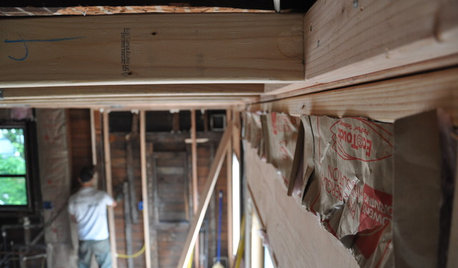Should contractor charge 20% fee on roofing material upgrade?
plan2remodel
8 years ago
Featured Answer
Sort by:Oldest
Comments (59)
Joseph Corlett, LLC
8 years agoplan2remodel
8 years agoRelated Discussions
Kitchen remodel - General Contractor charges
Comments (20)@Jaybar, from my 3 powder room estimates - the GC's percentage was of the entire project. They ranged from $40K to $67K plus TDB charges which aren't broken out or estimated yet. So I would pay the GC at least $6.6K (16.5%) for the $40K estimate and the $67K estimated wanted 20% ($13.4K). The kitchen estimates were 10% and 15%. I only got 2 quotes. You definitely want to look at line items. In my $40K powder room quote, some of the labor were obviously high. Demo was high but livable; plumbing was $1800 for the shower drain; and tiling for 96SF was $3,360 @$35/SF (this was high to me but I can swallow it if I really want the GC - my kitchen tiling was $8.75/SF and that was at top of market). He probably wanted more because it's a tiny powder room. What stopped me cold was the vanity in both estimates. I'm pushing the project off while I reassess the vanity choice. Bottomline, GCs will charge whatever they feel is appropriate for their business. Your job is to look at the details and total cost and decide what works for you. As an example, I paid $15K to repipe my house. The neighbor next door paid $5800 and the neighbor on next street paid $25K. Our houses are identical in size. We were all happy with our contractors. I wouldn't have traded my contractor for the lower cost that my next door neighbor paid even after the fact. I recommended my contractor to my neighbor and he didn't want to pay that price. He shopped until he got the price he wanted. My neighbor who paid $25K used her plumber and it was a single man job. For my $15K, my contractor had 8 people show up for the repiping, Xray specialist, 3 guys just for concrete and a 10 man crew who only did drywall. There were 3 days of construction. The $5800 job had 3 guys and spent 2 weeks. I saw the work and would have had reservation about the material they used inside the concrete slab....See MoreChoosing a Designer: Fee Upfront or No Fee?
Comments (47)You've been watching too much HGTV. Your expectations aren't realistic. No one does free work. If you do, then let us know where you work and you'll do a lot more of that. You doing some of the work, or hiring some of the trades, leaves you as the responsible party for coordinating everything. YOU are acting as the GC on the job. You may not realize that it will be up to you to catch all of the ''gotcha'', but that's what role you've taken on by trying to piece the job out. Demo is the worst thing to even think about DIYing unless you are extremely experienced. It ain't sledgehammer fun like TV shows. I guarantee you will end up with leaking shut off valves, because no one ever maintains them. If you don't know how to deal with a mini flood in the kitchen, you are beyond over your head in this project. You need to stop. You're wasting a bunch of people's time. Start wasting your own time. If you're gonna be the GC on the job and can't do a measured layout to twiddle around with, then you aren't ready to do a kitchen project. If you don't understand the (massive) electrical requirements that a new kitchen has, then you are not ready to move forward. If you do not understand how and when to design a properly supported overhang in stone, you are not ready to move forward. If you do not understand the proper support and substrate, and layout pattern of tile, and how to not tile in your appliances, then you are not ready to move forward. If you don't understand the chicken and egg conundrum of timing for a construction project, then you are not ready to move forward. Or, double your budget and hire a KD who works directly with a contractor. Or a design build firm. But, if you can't even develop enough trust with a good KD, then you need to go back to the drawing board for the entire project. It's doomed. You either have to man up and do ALL OF THE WORK, including design, or let go and trust....See MoreAre my contractor's tile setting charges normal?
Comments (10)I would agree with Avanti & Tundra. Custom showers are priced as a complete project. S/F pricing means nothing. Specify material selections, installation details to be followed and waterproofing system to be used. Your breakdown would consist of material, tax & labor. I would never provide amounts. That just opens things up for long discussions about line items. Which is the point of this thread. Get quotes from tile contractors and compare the total cost. What's included and what is not....See MoreShould I worry? Contractor took cabinet $, has gone dark on us.
Comments (148)If the company you chose has a good reputation and a history of happy customers then it may be a matter of miscommunication, where each party is 15 percent off in understanding what the other is saying. Sometimes that just happens. And when it happens each party gets irritated. I think for customers it feels like we are staring at a black box in terms of the actual building process. We don’t know what we don’t know. Four days, for example, is not a long turn around time to get an estimate on a counter, because the shop needs the specs from the contractor first and then someone on their end needs to sit down and do the math and a rough drawing and get the bid back to the contracter. In my case one stone .outfit took a week to reply, another took two weeks. And maybe the designer is frustrated, thinking they’d done all this work to get you the price in a timely manner, what do you care about the details? It is a good price btw, i would thank the person for their fast reply (despite the rude All Caps thing) and ask where I should go the view the material. You don’t know what they’ve found for you until you actually see it. Re In picking a slab at the stone yard, the people there mark your selection with your name. In my case I took a pix of the slab and the inventory number while at the yard. What you pick on-site should be what you get. I would then send a cheerful note to the project manager with the inventory number and how you are looking forward to your counters. I did a succession of fairly major projects ( kitchen remodel, rebuild of corner of house and basement, replacement of fencing, and deck, gutters, HVAC, appliances, flooring for the entire house, installation of new sub panels, and rewiring for kitchen, replacement of lighting fixtures interiors and exterior, etc. It involved multiple subcontractors. My take away was this: most of these people are working on multiple projects and when you leave them a message their first thought is “is it on fire?” If there isn’t anything on fire and if you sent a page of questions then they will take care of any parts that seem sensible to them for that stage of the project then wait a couple of days and send some laconic message that seems completely opaque. It doesn’t mean things aren't on track or that stuff isn't happening. If you stick with these people then focus on your part of it - it’s fair to ask when they need your selections, and then get them the information they need. If the job is now slated to start in late July and they have the cabinets onsite then, to their mind, the job is “on the calendar“ I.e. it’s a happening thing. That is their reality and their understanding of the process. Nothing so far says they are going to flit out of town or refuse to supply soapstone instead of quartz. My suggestion would be to keep things amicable, keep good records, politely stick to your choices, and see how it goes....See Morebry911
8 years agolast modified: 8 years agoUser
8 years agoUser
8 years agoUser
8 years agolast modified: 8 years agomike0814
8 years agoJoseph Corlett, LLC
8 years agobry911
8 years agoplan2remodel
8 years agoplan2remodel
8 years agobry911
8 years agoJoseph Corlett, LLC
8 years agobry911
8 years agolast modified: 8 years agoplan2remodel
8 years agoJoseph Corlett, LLC
8 years agobry911
8 years agolast modified: 8 years agoplan2remodel
8 years agoJoseph Corlett, LLC
8 years agobry911
8 years agolast modified: 8 years agoJoseph Corlett, LLC
8 years agolast modified: 8 years agoJoseph Corlett, LLC
8 years agobry911
8 years agolast modified: 8 years agoJoseph Corlett, LLC
8 years agolast modified: 8 years agobry911
8 years agolast modified: 8 years agoJoseph Corlett, LLC
8 years agolast modified: 8 years agogreg_2015
8 years agoJoseph Corlett, LLC
8 years agobry911
8 years agolast modified: 8 years agoOaktown
8 years agoUser
8 years agolast modified: 8 years agoplan2remodel
8 years agoJoseph Corlett, LLC
8 years agobry911
8 years agolast modified: 8 years agoUser
8 years agolast modified: 8 years agoJoseph Corlett, LLC
8 years agoUser
8 years agolast modified: 8 years agoplan2remodel
8 years agobry911
8 years agomillworkman
8 years agolast modified: 8 years agoUser
8 years agolast modified: 8 years agoplan2remodel
8 years agoUser
8 years agoJoseph Corlett, LLC
8 years agoplan2remodel
8 years agobry911
8 years ago
Related Stories

REMODELING GUIDESContractor Fees, Demystified
Learn what a contractor’s markups cover — and why they’re worth it
Full Story
REMODELING GUIDESContractor's Tips: 10 Things Your Contractor Might Not Tell You
Climbing through your closets and fielding design issues galore, your contractor might stay mum. Here's what you're missing
Full Story
WORKING WITH PROSHow to Hire the Right Architect: Comparing Fees
Learn common fee structures architects use and why you might choose one over another
Full Story
REMODELING GUIDESContractor Tips: What Your Contractor Really Means
Translate your contractor's lingo to get the communication on your home project right
Full Story
MATERIALSThe Most Popular Roofing Material is Affordable and Easy to Install
Asphalt shingles, the most widely used roof material in the U.S. are reliable and efficient, and may be right for you
Full Story
CONTRACTOR TIPSContractor Tips: How to Shop for Your Remodel
Small mistakes in buying remodeling materials can add up to huge cost overruns. Here's how to get things right the first time
Full Story
MOST POPULAR10 Things to Ask Your Contractor Before You Start Your Project
Ask these questions before signing with a contractor for better communication and fewer surprises along the way
Full Story
MOST POPULARContractor Tips: Top 10 Home Remodeling Don'ts
Help your home renovation go smoothly and stay on budget with this wise advice from a pro
Full Story
CONTRACTOR TIPSWhat to Look for in a Contractor's Contract
10 basic ingredients for a contract will help pave the way to remodel happiness
Full Story
CONTRACTOR TIPS10 Things to Discuss With Your Contractor Before Work Starts
Have a meeting a week before hammers and shovels fly to make sure everyone’s on the same page
Full Story





bry911